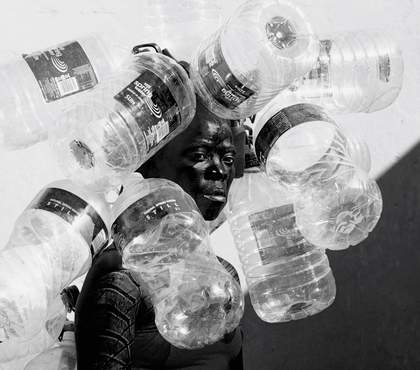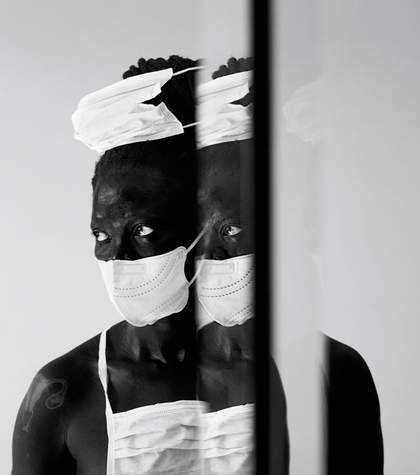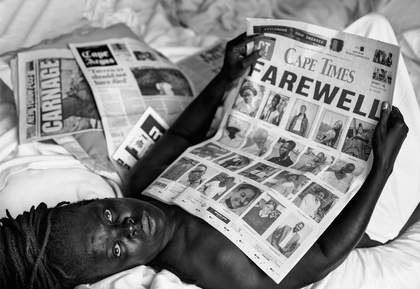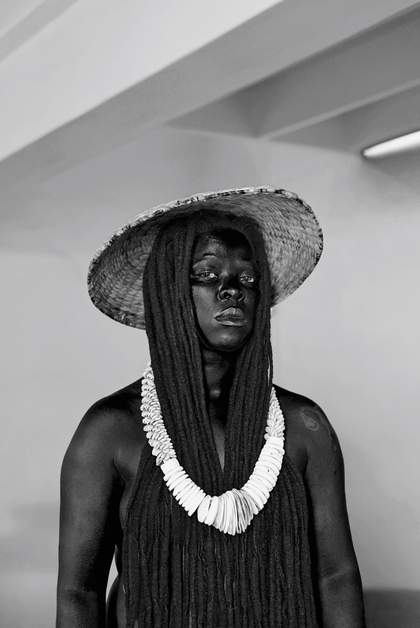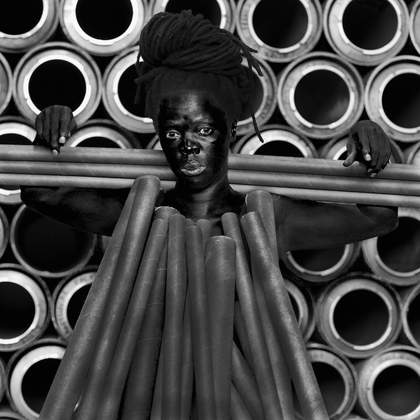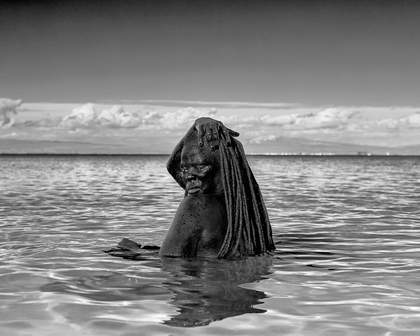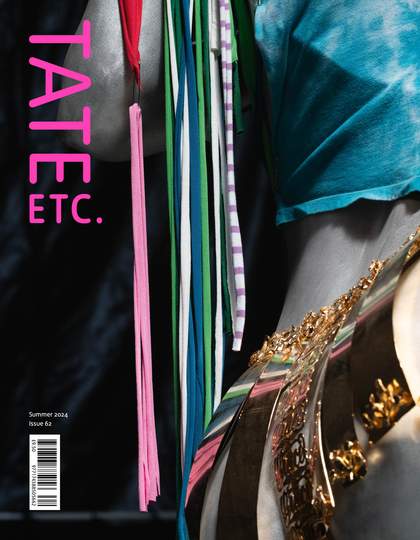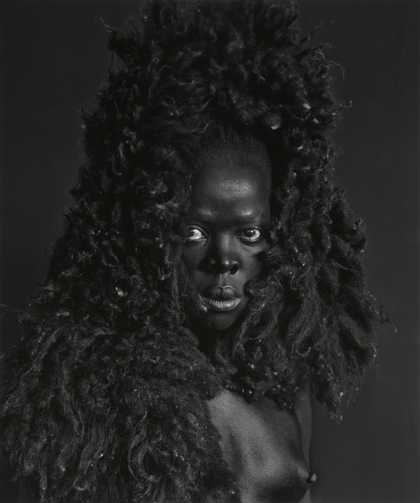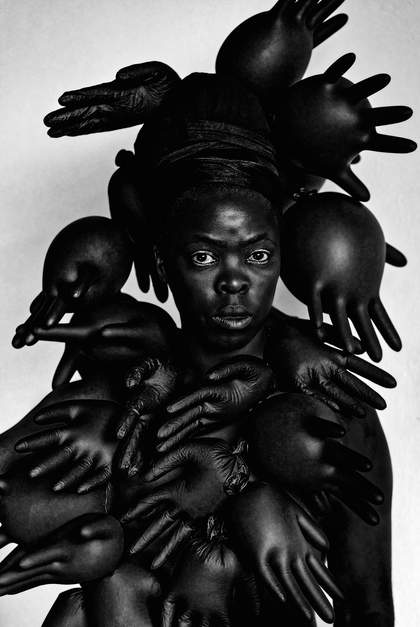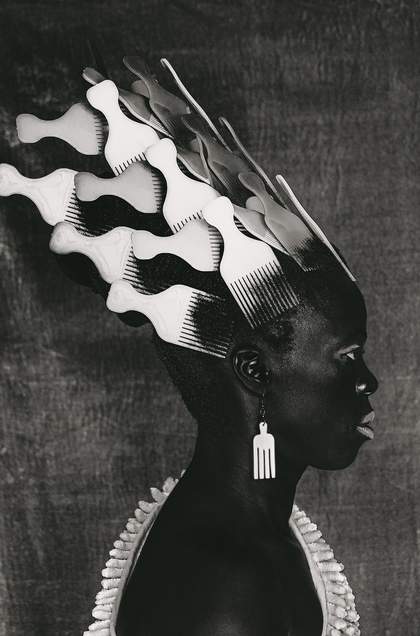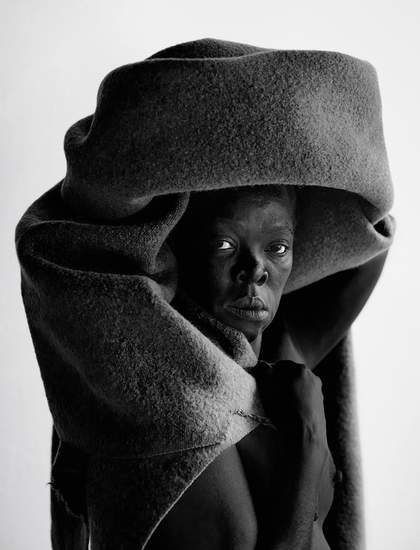
Zanele Muholi
Sazi I, San Francisco 2022
© Zanele Muholi. Courtesy of the artist and Yancey Richardson, New York
Thank you ... for the pebbles of inspiration.
– Ellen Kuzwayo to Audre Lorde, 1990
When South African women's rights activist, organiser and educator Ellen Kuzwayo travelled from Soweto to Boston to honour the Caribbean-American poet and mother warrior Audre Lorde in front of a thousand people, she spoke of pebbles. Kuzwayo offered the Black, lesbian, feminist, socialist writer a praise song – not to the boulder, the meteor, or the monolith, but to the pebble.
Maybe this was Kuzwayo’s transnational Black feminist praise for precision. Or persistence. In the way that pebbles can disrupt a water’s surface from many angles, or send ripples far beyond the point of impact. If so, I offer my praise to Zanele Muholi’s ongoing photo series Somnyama Ngonyama, Hail the Dark Lioness on the same terms. I choose David’s scale, not Goliath’s. Ammunition for a slingshot, not a bomb. The smallest stone. Something you can hold in your hand. Something almost anyone can access.
Especially if their world is falling apart.
In each self-portrait, Muholi disrupts the surface. Not in one way, but in seemingly infinite ways. With a surgical mask of many folds. A newspaper recounting deaths. The lengths and openings of pipes. A necklace of a thousand tiny shells. And, most importantly, with their gaze.
As both subject and author of each image in the series, Muholi breaks through in multiple directions, reminding us that we are not mere consumers of these images. We, too, are subjects and authors of lives whose depths remain mysterious even to those living them. We might notice that the everyday objects around us are masks, headdresses, props. Our bottles of water. Our extension cords. Our blankets. And will we look or are we afraid to look? What will we do as the familiar becomes unfamiliar all around us? As the fourth wall, and maybe even the third and the second wall, breaks and we must reconsider whether it is ethical, or even possible, to play our pre-existing parts.
In Manzi I, West Coast, Cape Town 2022, my favourite image in this series, Muholi emerges from the water. The droplets on their skin and the indentations of the ripples on the ocean’s surface offer infinite refractions. The wavy mirror image of Muholi in the water could take any form. With their hand on their head, one eye nearly closed, they offer us the challenge of our own transformation.
In this work, Muholi does what Audre Lorde does. They look at themself so intensely that we see ourselves anew. But first, our idea of who we thought we were, our normative reality, scatters. We are left holding uncountable mirrors, each the size of a droplet of water. The scale of one decision. Each a founding ocean, source of life to a planet the size of the smallest stone. A pebble.
What do you hold in your hands?
Zanele Muholi at Tate Modern, until 26 January 2025.
Alexis Pauline Gumbs is a writer, independent scholar, poet, activist and educator based in Durham, North Carolina. She was awarded the National Humanities Center Fellowship for her forthcoming book, Survival is a Promise: The Eternal Life of Audre Lorde, published in August.
Supported by the Huo Family Foundation with additional support from the Zanele Muholi Exhibition Supporters Circle and Tate Americas Foundation. Research supported by Hyundai Tate Research Centre: Transnational in partnership with Hyundai Motor. Organised by Tate Modern in collaboration with the Maison Européenne de la Photographie, Paris, Gropius Bau, Berlin, Bildmuseet at Umeå University, Institut Valencià d’Art Modern, Valencia, GL Strand, Copenhagen, National Gallery of Iceland, Reykjavik, and Kunstmuseum Luzern, Luzern.
The media partner is Dazed. Curated by Carine Harmand, John Ellerman Foundation Curator, Tate Liverpool; Yasufumi Nakamori, former Senior Curator, Photography, Tate Modern; Amrita Dhallu, Assistant Curator, International Art, Tate Modern; Sarah Allen, former Assistant Curator, International Art, Tate Modern, and Kerryn Greenberg, former Head of International Collection Exhibitions, Tate. The media partner for Zanele Muholi is Dazed. The exhibition in 2020 was supported by the Zanele Muholi Exhibition Supporters Circle, Tate International Council, Tate Patrons and Tate Members.

